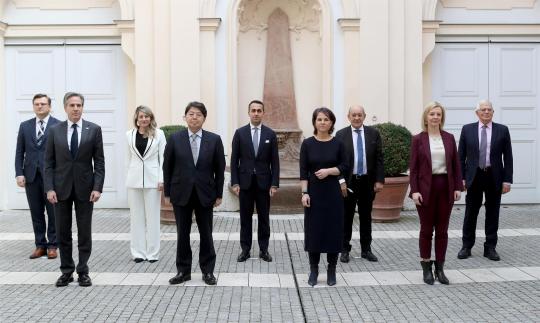#G7 foreign ministers
Text
ISRAEL HITS IRAN
(https://www.youtube.com/watch?v=FRzrj17Dn8s)
Well, now we know the answer to the question of how Israel planned to respond to Iran’s recent attack. Explosions were reported early on Friday near the northwestern Iranian city of Isfahan, in what several major outlets reported, citing US officials and local sources, as an apparent Israeli strike.
The blasts come just days after Iran launched its…
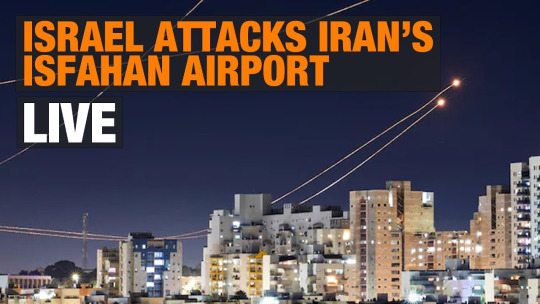
View On WordPress
#Alireza Zakani#Bangladesh#Brexit#British Muslims#Brussels#Capri#Cardinal Ludwig Muller#Charlie Hebdo massacre#Claridge#climate change#Concert Noble#Damascus#David Cameron#Donald Trump#Emir Kir#Eurasia Group#European Convention of Human Rights#Eurosceptic attitude#Foreign Minister Baerbock#G7#Gordon Brown#Gregory Brew#Hamas#Hindus#Iran#Ishfahan#Israel#Jews#jihad#Kiev
0 notes
Text
G7 Sanctions Enforcement Coordination Mechanism and Centralized EU Sanctions Watchdog Proposed
On Feb. 20, 2023, Dutch Minister of Foreign Affairs Wopke Hoekstra gave a speech titled “Building a secure European future” at the College of Europe in Bruges, Belgium where he made a plea to “(…) sail to the next horizon where sanctions are concerned.” The Dutch Foreign Minister said European Union (EU) “(…) sanctions are hurting the Russians like hell (…)” but at the same time the measures “(…)…

View On WordPress
#Belgium#Brussels#Dutch Foreign Minister#EU#EU Sanctions#European Union#G7#OFAC#office of foreign asset control#Russia#Sanctions
0 notes
Text

OPEDS

Is it time to go?
By Howard Sackstein
Today, the South African Jewish community numbers but one third of what it did at its peak. Though our numbers have shrunk, the vibrancy of our community has remained intact.
In the 1970s and 1980s they used to joke, “When the Jews go; it’s time to leave, when the Portuguese go; it’s too late.”
The clock ticked, and stopped on 7 October 2023.
The behaviour of the South African government was nothing short of betrayal. President Cyril Ramaphosa’s failure to condemn the 7 October massacre; his failure to reach out to the families of the two South Africans massacred in the Hamas genocide; his failure to act on the two South Africans kidnapped by Hamas; and his smirk blame of Israel for deserving the attack two weeks after the massacre, while wearing a Palestinian keffiyeh, will forever be a symbol of his Judas moment.
In American politics, they talk of a “tortoise on a lamppost”. Sometimes, the tortoise mistakenly believes that it got onto the lamppost by itself.
Ramaphosa’s spineless leadership has allowed his jihadist foreign minister, Dr Naledi Pandor, and her mujahidin director general, Zane Dangor, to direct foreign policy without intervention. Pandor mislead Parliament by claiming that there were no beheadings of babies and that Israel had attacked the Al-Ahli Arab Hospital. With no South African diplomats in Israel and Al Jazeera as her only source of information, Pandor meanders in the dark. Her ignorance, however, is self-inflicted. Her department was invited to view the 47-minute video of Hamas-captured atrocities, and declined to attend.
Hamas informs us that Pandor telephoned it to congratulate it on the success of its “Al-Aqsa Flood” attack on Israel. Pandor claimed that she was merely offering humanitarian assistance, but refused to release the “call-out” transcript of the conversation. As a convert to Islam, Pandor uses her own zealotry to pursue a pro-Hamas agenda to the detriment of South Africa.
In December, Hamas visited South Africa, was feted in our Parliament, and celebrated in the African National Congress’ (ANC’s) offices in Johannesburg. When Ramaphosa finally met the South African Jewish Board of Deputies, he sprinted to issue a statement and later, while meeting the Muslim community, stated that they had issued a statement as “we’re concerned there are distortions”. Given that the president’s statement was issued first, this both makes no logical sense and effectively paints the official representative body of Jews in South Africa as liars.
It’s a clash of civilizations. Jews have traditionally ascribed to the values of Western liberal democracy. In the ANC’s hard-left, revolutionary world view, Western interests must be opposed everywhere – in Ukraine, in Morocco, and in Israel. South Africa believes that it must be the vanguard liberation movement celebrating the imagined successes of Iran, Cuba, Venezuela, and Russia. Pandor is currently attending the 7th Africa-Cuba Solidarity Conference in White River.
But actions have consequences. The West is becoming increasingly disenchanted by South Africa’s antics. Last year, South Africa’s invitation to the G7 Summit didn’t materialise, and the currency has lost 50% of its value under Ramaphosa. The renewal of the African Growth and Opportunity Act looks increasingly precarious together with the approximately 250 000 jobs it created. South Africa is increasingly isolated from those countries which could help it the most.
Ramaphosa had a choice to turn South Africa into a Singapore or a Sudan. He chose Sudan.
40 notes
·
View notes
Text
[DW is German State Media]
Running an administration made up of three staunchly right-wing parties appears to be tedious but it hasn't changed her, says the leader of the post-fascist, radical right-wing Brothers of Italy party.[...]
Over the past year, Meloni, 46, hasn't repeated any of the more radical slogans she was so fond of while campaigning. At home in Italy, she is trying to shape domestic policy according to strict conservative family ideals while on the economic front she has more or less carried on with the relatively successful policies of her predecessor, Mario Draghi.
Meanwhile at the European level, she has been almost moderate. One doesn't hear acerbic criticism of the EU from her these days and around the world, she seeks out friends and allies. In fact, she leaves the radical statements to her coalition partners: Matteo Salvini of the right-wing League (in Italian, Lega) party and Antonio Tajani, the country's foreign minister and head of Forza Italia, which was previously led by the late Silvio Berlusconi.[...]
The one thing that doesn't seem to weigh on her daily duties as Italy's leader is the fact that her own party's logo features the eternal flame that sits on the tomb of former Italian dictator Benito Mussolini.
Her partners in Europe also seem to be looking past that. One hears EU administrators in Brussels confess surprise at how "mild-mannered" and "soft-spoken" the Italian leader has become.[...]
At a Rome press conference with Germany's Chancellor Olaf Scholz, head of the centrist Social Democrats, Meloni told reporters that both were in agreement on all of the most important policy areas and that they were looking for pragmatic cooperation. Scholz didn't object. Meloni also seems to have built a rapport with European Commission president Ursula von der Leyen. [...]
During a recent visit to the Italian island of Lampedusa, von der Leyen and Meloni also seemed to be on the same page when it came to migration policy. That means monitoring borders, reducing arrivals and collaborating more closely with transit countries.
Meloni's suggestion that the navy should blockade the coasts of North Africa was the only one that didn't win support from von der Leyen. The two women have already traveled to Tunisia twice to try and wring an agreement out of the autocratic Tunisian president on holding back migrants. Meloni sees that as part of her strategy to focus more on North Africa than previous heads of state have done, in her bid to stem migration.[...]
The heads of the EU and G7 states were actually relieved when Meloni expressed unconditional support for Ukraine in the war with Russia. US President Joe Biden praised Meloni's stance about how defending Ukraine also defends Europe's freedom.
"I hope you'll be nice to me," Biden joked when Meloni visited him at the White House in Washington this summer. Meloni responded with a telling laugh. Only a year ago Biden had branded her election victory a danger to democracy. Meloni let it be known that the pair were on friendly terms again after the one-on-one meeting in Washington.
Meloni, who was completely inexperienced in foreign policy, has also been making friends at international summits, such as the recent G20 meeting in New Delhi. The public affection demonstrated by India's nationalist Prime Minister Narendra Modi prompted excited comments on social media in that country. The names, Meloni and Modi, were melded to create the new label "Melodi."
A win for moderation! /s
24 Sep 23
45 notes
·
View notes
Text
The US has used its veto at the UN security council to block a resolution calling for Israel to allow humanitarian corridors into the Gaza Strip, a pause in the fighting and the lifting of an order for civilians to leave the north of the besieged territory.
The text – supported by 12 of the 15 members of the security council on Wednesday – contained criticism of “heinous terrorist crimes by Hamas” and made no direct reference of Israel. In an attempt to win US support, the draft resolution did not explicitly call for a ceasefire, instead referencing a “humanitarian pause”.
But the US ambassador to the UN, Linda Thomas-Greenfield, said the resolution, carefully crafted by Brazilian diplomats, was unacceptable because it made no mention of Israel’s right to self-defence. The UK abstained, saying the resolution lacked mention of the way Hamas was using ordinary Palestinians as human shields.
The US ambassador said she was horrified and saddened by the loss of life, but that the actions of Hamas had brought about the humanitarian crisis. She also called for time to let Joe Biden’s diplomacy play out.
Israel thanked the US for using its veto. China described the move as “nothing short of unbelievable” while Russia said it was an example of US double standards.
Two members of the G7 on the council – Japan and France – broke with the US by backing the motion.
The draft resolution also called for “humanitarian pauses to allow full, rapid, safe and unhindered humanitarian access for United Nations humanitarian agencies”. Its failure to pass represented another blow to the authority of the world body.
Meanwhile, a meeting of the 59-strong Organisation of Islamic Cooperation in Riyadh accused Israel’s forces of targeting al-Ahli Arab hospital in Gaza.
Tuesday’s explosion, which killed hundreds, was blamed by Palestinian officials on an Israeli airstrike. Israel said it was caused by a failed rocket launch by the Palestinian Islamic Jihad militant group, which denied responsibility.
Israel has been using media and diplomatic channels to try to convince leaders of Arab countries that blast was caused by militants, after even its regional allies rushed to blame it for the explosion.
In the only sign of a reassessment by Arab states, the United Arab Emirates ambassador to the UN, Lana Zaki Nusseibeh, called for an independent investigation into the hospital strike and said anyone found guilty should be held to account. But she said regardless of the culprit, the death toll of Palestinians was unacceptable.
The dispute over responsibility may have little resonance among the Arab public. A former French ambassador to the US, Gérard Araud, said: “The truth about who was responsible for the Gaza hospital strike is now irrelevant. Public opinion has decided: Israel is the culprit. All the explanations won’t do anything. This is a major defeat for Israel. It will have political consequences.”
Arab state foreign ministries have issued individual statements condemning Israel for the explosion, including Bahrain, which established ties with Israel in the Abraham Accords of 2020.
Morocco, another country that recognised Israel in 2020, also blamed it for the strike, as did Egypt, which became the first Arab country to normalise relations in 1979.
Saudi Arabia, which has ended talks on potential ties with Israel since the Israel-Hamas war flared, called the blast a “heinous crime committed by the Israeli occupation forces”.
The rapid apportioning of blame coincided with angry rallies across the region, with more planned on Wednesday after calls for a “day of rage”.
A mini-summit between Joe Biden and Arab states, as well as the leader of the Palestinian Authority, Mahmoud Abbas, was due to be held in Amman on Wednesday, but has been cancelled. The Jordanian foreign minister, Ayman Safadi, said the summit would be held only “when the decision to stop the war and put an end to [the] massacres” was taken.
The authority of most Gulf monarchies is secure, but they know what they risk if they are seen to be siding with Israel’s version of events at present. The popularity of Abbas, seen as a security subcontractor for Israel by some Palestinians, was already at a low ebb.
Years of patient work trying to build a new relationship between Israel and some Arab states looks set to be undone, a trend that will delight hardliners in Iran, Lebanon and Palestine. Some extremists in the Israeli government also have no interest in a relationship with Arab states if it involves compromise over the Palestinian question.
The Egyptian president, Abdel Fatah al-Sisi, issued a warning that he could unleash protests inside Egypt if Israel did not back down.
He again said Israel was seeking to expel Palestinians over the Gaza southern border into the Sinai peninsula and said to Israel: “The Negev Desert [about 4,500 sq miles of land in southern Israel] is before you if you want to displace Palestinian citizens, but not Sinai, and then Sinai will not become a base to attack you and for you to use it as an excuse to attack Egypt.”
He has been demanding Israel allow aid into Gaza through the Rafah crossing into Egypt, but only with US-backed Israeli assurances that Israel will not attack the convoys. Israel fears the convoys will contain ammunition for Hamas, a central issue in the talks between Israel and the US secretary of state, Antony Blinken.
#un security council#us foreign policy#israel palestine conflict#organization of islamic cooperation#al ahli baptist hospital
19 notes
·
View notes
Text

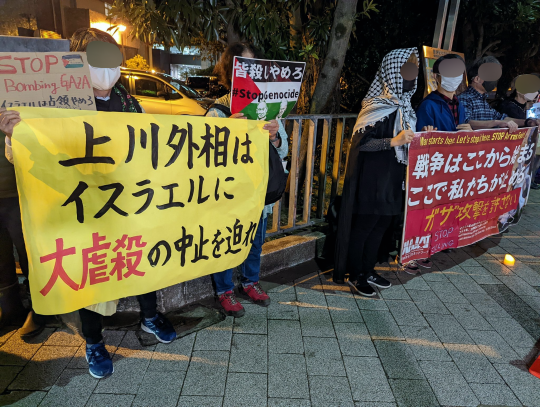


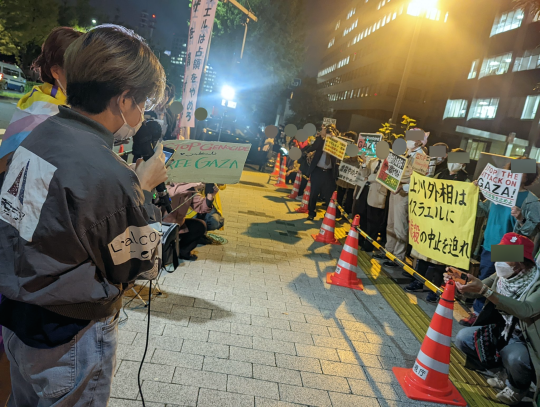

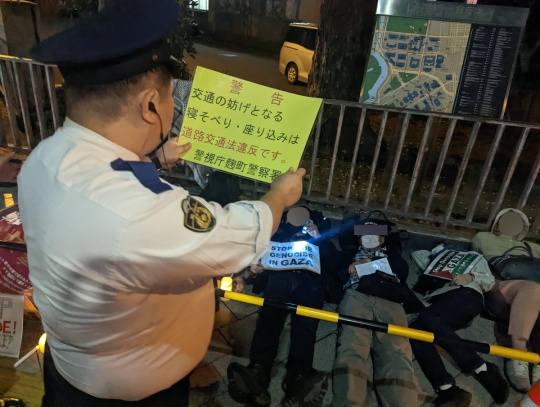
Photos from a die-in in front of the Prime Minister’s Office (首相官邸) in Tokyo, Japan, on 2 Nov. The protest was led by the Network Against Arms Trafficking (武器取引反対ネットワーク) (NAJAT). The rally description states:
The Israeli military continues to massacre Gaza residents by carrying out unprecedented and violent indiscriminate air strikes , as well as launching an invasion by ground troops. Already, more than 8,300 people, including more than 3,400 children, have been killed, creating an unprecedented humanitarian crisis.
Under these circumstances, the Japanese government has decided to impose sanctions, including asset freezing, on Hamas executives who carried out indiscriminate attacks. On the other hand, it has not clearly condemned the genocide committed by Israel, abstained from the United Nations General Assembly's humanitarian truce resolution, and has not called for an end to the attacks. This is clearly a double standard.
First of all, we need a ceasefire as soon as possible. While the so-called "G7" countries, such as the United States and Europe , are effectively supporting the genocide committed by Israel, Japan, which has barely distanced itself from it, has an important role to play. The Japanese government should use every means possible to pressure the Israeli government into agreeing to a ceasefire, including reviewing the Japan-Israel Defense Exchange Memorandum and the Japan-Israel Investment Agreement, as well as imposing economic sanctions. We will hold a die-in in front of the Prime Minister's official residence, demanding that Foreign Minister Kamikawa, who will be visiting Israel and other countries starting November 2nd, firmly demand that the Israeli government stop the attacks.
Sugihara Koji, a representative from NAJAT, shared photos and video from the action, stating that 150 people participated in the die-in. Participants also read messages from Gazans describing the situation on the ground.
"I think about how lonely the injured men, women and children in the hospital are. I can't stop thinking about that child waiting for her mother to come back to life or that woman waiting for her family to get out of the rubble. Gaza feels so alone and betrayed."
Another participant shared a statement:
When I tell my friends about Gaza, they say, "It's complicated, isn't it?'' Our crime is that we start with, "It's complicated, isn't it?'' People who have the right to live the same lives as us are simply killed. The world is ignoring our voices and saying, "You have no dignity." It's not because it's difficult, but let's listen to the voices that are out there and raise our voices.
Die-in participants were harassed by Kojimachi police who stated, “Lying down or sitting in a way that obstructs traffic is a violation of the Road Traffic Act.” Sugihara stated that local police had “lined up the cones in advance and regulated it, so it [wasn’t] obstructing traffic at all.”
19 notes
·
View notes
Text
Statement by Antonio Tajani, Minister for Foreign Affairs and International Cooperation of Italy in his capacity as Chair of the G7 Foreign Ministers’ Meetingat the Munich Security Conference (17 February 2024) PDF via Japanese MInstry of Affairs.
Paul Woodward noting that no U.S. news outlet has reported this comnuniqué seems significant. There's the poverty of reporting and is the glaring contridiction between what the G7 says and what is done. But as well is the implication that informed publics are besides the point.
8 notes
·
View notes
Text
G7 delayed decision on use of frozen Russian assets until June
The G7 has postponed a decision on the use of frozen Russian assets until June, according to a statement issued by the G7 foreign ministers following their meeting in Capri.
The document notes that the parties will continue to study options “in accordance with our legal systems and international law.” The results of the “study” will be presented at a meeting of G7 leaders in June.
Washington supports the confiscation of Russian assets, while EU countries say this is a violation of international law, insisting that the profits from the assets be used in Ukraine’s favour.
On Thursday, European Commission Executive Vice President Valdis Dombrovskis expressed hope that the European Union, which holds the lion’s share of the frozen assets, would approve in the coming months a separate EU measure to use profits or interest earned from the assets to help Ukraine.
Read more HERE
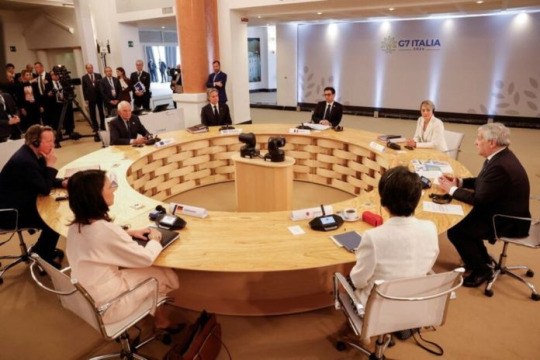
#world news#world politics#news#g7#g7 summit#ukraine#ukraine war#ukraine conflict#ukraine news#ukraine russia news#ukraine russia conflict#russia ukraine war#russia ukraine crisis#russia ukraine conflict#russia ukraine today#russian asset
3 notes
·
View notes
Text
Ukrainian leader holds meetings with Lula and Boric

Ukrainian President Volodymyr Zelensky Wednesday met separately with his Brazilian and Chilean colleagues on the sidelines of the United Nations General Assembly in New York.
After a frustrated encounter during the G7 Summit in Hiroshima earlier this year, Zelensky finally met with Brazil's Luiz Inácio Lula da Silva.
“We had a good conversation about the importance of the ways to build peace and to always maintain an open dialogue between our countries,” Lula wrote on social networks. He also confirmed that his former foreign minister and special Advisor Celso Amorim would participate in the Copenhagen process in the search for a peace agreement between Russia and Ukraine.
The meeting took place “in a calm and friendly atmosphere, in which they exchanged information about each of the countries and the current situation in the world,” Brazil's current top diplomat Mauro Vieira told reporters.
Continue reading.
#brazil#politics#ukraine#chile#ukrainian politics#brazilian politics#chilean politics#volodymyr zelensky#luiz inacio lula da silva#gabriel boric#international politics#mod nise da silveira#image description in alt
8 notes
·
View notes
Text
G7 calls on Taliban to stop restricting women's rights
New Post has been published on https://www.timesofocean.com/g7-calls-on-taliban-to-stop-restricting-womens-rights/
G7 calls on Taliban to stop restricting women's rights
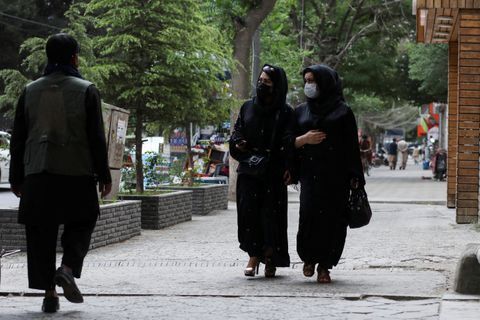
Paris (The Times Groupe)- The Group of Seven (G7) foreign ministers said on Thursday that the Taliban’s increasing restrictions on women and girls’ rights in Afghanistan are isolating the country.
“These measures further isolate the Taliban from the international community,” said the G7 foreign ministers and European Union foreign policy chief.
French officials urged the Taliban to take immediate action to lift restrictions on women and girls, and to respect their human rights, in a joint statement.
In another step toward their past hardline rule, the Taliban, who swept back to power after the Afghan government collapsed last year, ordered women to cover their faces in public on Saturday.
#Afghan government#afghan news#afghanistan news#European Union foreign policy chief#G7 foreign ministers#girls' rights in Afghanistan#Group of Seven (G7)#hardline rule#human rights in Afghanistan#human rights in middle east#islam in afghanistan#Paris#Taliban#The Times Groupe#Times#Times Of Ocean#Unravel News#women's rights in afghanistan#World
0 notes
Text
Netanyahu Tells West Israel Will Decide How to “Defend” Itself (i.e., Israel Will Decide If the West Goes to War)
By Andrew Anglin

This means “Israel will decide how to deploy the US military.”
The US is locked into a suicide pact with Israel, which means that if Israel starts a war, the US has to join.
Everyone knows this.
What Netanyahu is saying here is just gibberish. He’s not deciding for Israel. Israel would be barely involved in a war with Iran (yes, they have a bunch of high-tech missile stuff – all gifted by the American taxpayer – but their military is small and they don’t have a bunch of ships like the US). He is deciding for Americans if we will have a war with Iran.
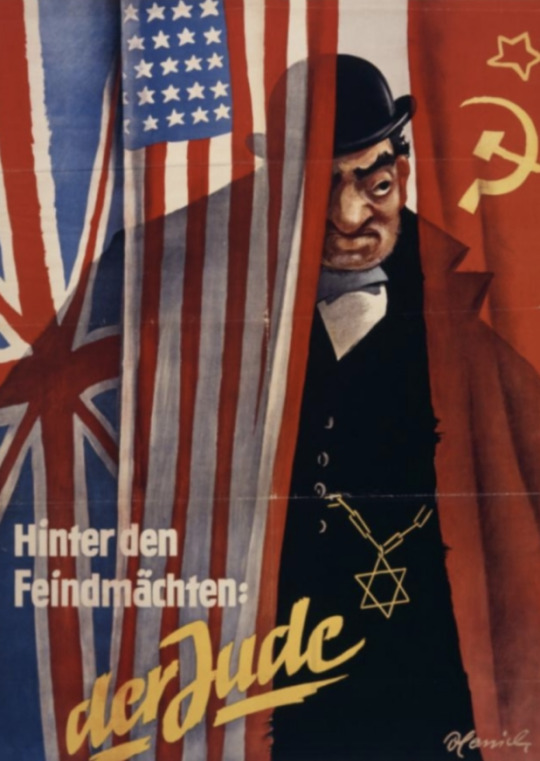
This is evil Nazi propaganda. It’s also an accurate portrayal of the way the world works. But if you notice it, you’re evil.
It’s just absurd that this discussion is even possible. Or rather, it is absurd that the real discussion surrounding Israel, and the Jewish stranglehold on America, is impossible.
Reuters:
Israel will make its own decisions about how to defend itself, Prime Minister Benjamin Netanyahu said on Wednesday, as Western countries pleaded for restraint in responding to a volley of attacks from Iran.
The United States, European Union and G7 group of industrialised nations all announced plans to consider tighter sanctions on Iran, seen as aimed at mollifying Israel and persuading it to rein in its retaliation for the first ever direct Iranian strikes after decades of confrontation by proxy.
Netanyahu met the German and British foreign ministers, who both travelled to Israel as part of a coordinated push to keep confrontation between Israel and Iran from escalating into a regional conflict fueled by the Gaza war.
youtube
Netanyahu’s office said he thanked David Cameron and Annalena Baerbock for their support, while telling them: “I want to make it clear – we will make our own decisions, and the State of Israel will do everything necessary to defend itself.”
Earlier, Cameron said it was now apparent Israel planned to retaliate for the Iranian missile and drone strikes, which Tehran launched on Saturday in response to a presumed Israeli airstrike that killed military officers at its embassy in Syria.
Baerbock said escalation “would serve no one, not Israel’s security, not the many dozens of hostages still in the hands of Hamas, not the suffering population of Gaza, not the many people in Iran who are themselves suffering under the regime, and not the third countries in the region who simply want to live in peace.”
Britain and Germany are also in this suicide pact with the Jews, because they are both subsidiaries of Washington, Inc.
No one wants the Jews to start this war.
But they are going to start this war.
As I’ve said six million times: there is no reason they would have allowed Hamas to attack in the first place if they weren’t planning on maximally escalating.
The Israelis are aware that both:
US support for Israel is failing
The US itself is failing
They are running out of time to clear out all their enemies, and their biggest enemy is Iran. In fact, that’s the enemy that fuels all their other enemies, including Hamas (even though Hamas is a Sunni group, it’s primarily funded by Shias, because Shias are the only ones in the region who will actually do anything about these Jews).
The hilarious thing is that all of these people who are begging Bibi to stop are obsessed with the Ukraine war, and if this Middle East mania pops off, there won’t be any Ukraine war. There is no possible way the West can keep up two major wars at once.
Never mind their plans for starting a war in the Pacific by using the Filipinos as sharkbait.
The next big war the West gets dragged into will be its last war. All three of its enemies are capable of either:
Winning, or
Making sure the West does not win
And it’s the same thing.
If the West does not win, they lose, because they are going to have to keep pouring resources into a bottomless pit, looking like lunatics in front of the rest of the world, while the Chinese stand by shaking their heads and making ultra-money.
People are sick of these wars, and everyone knows that Washington is causing all of them. No one else in the world wants them. Israel wouldn’t exist without Washington, nor would the Ukraine, and the Filipinos would be begging the Chinese for investment money rather than threatening them with a war.
The same is even true of smaller conflicts with little global relevance, such as in Armenia or Kosovo (Serbia, actually). The Washington Jews are now telling Thailand to invade Cambodia. They are backing the terrorists in Bangladesh.
No one else wants all of these wars. People are sick of it.
Everyone in the world is cheering Hamas, they are cheering Iran, they are cheering Russia. Meanwhile, they’re all trying to get rich with the Chinese.
We stand at the precipice.
A new world order is coming into view.
There is This One Thing I’ve Been Thinking About Though…
It’s not made any sense to me how these people were creating all this chaos and obviously destroying America, which is their only hope for world domination.
Then I read the books from the show Silo.
youtube
I didn’t really like the show (too blacked), but I found the mysterious cliffhanger ending super annoying, so I got these books and read them. In the books, you find out that the people who built the Silos – underground fallout bunkers designed to last for hundreds of years – purposefully started a nuclear war to eliminate all life on the surface.
I started thinking “well, that is actually possibly the plan of people in Washington…” It’s the only thing that would make any sense.
Then, I watched the new Fallout series – it’s the same plot. This was not in the games, but in the shows, the people who built the fallout shelters – Vault-Tec – purposefully started a nuclear war so they could wipe the surface of the Earth clean and then repopulate it.
youtube
The basic explanation, in both cases, is that elites in America decided to end all war and save natural resources by totally killing everyone on Earth save for a small group of people.
I’m not saying this is what is going on. But it’s very interesting that there are two popular shows with this same plot.
Remember when Channel Four made a show about the government faking a flu virus so they could distribute a vaccine that would reduce the population?
Remember when the X-Files spin-off The Lone Gunmen featured the government flying planes into the World Trade Center to blame it on Moslems and start an “international war on terrorism”?
youtube
This stuff shows up in TV shows, for whatever reason. (The reason why is a whole other thing. I don’t think it’s a satanic ritual, as many people who point out this phenomenon of shows predicting reality will claim. It probably has more to do with the CIA and just Jews in general being involved in Hollywood, and people having a bit too much to drink.)
The idea that Silo and Fallout are showing a real apocalypse agenda is really just a wild theory. There is no reason to believe it’s true. It just seems plausible, if you think about it. Most likely, the people in Washington are as insane as they look. But I did find it intriguing.
It’s worth looking on 4chan for posts about a secret system of underground fallout shelters designed to sustain a population for hundreds of years.
2 notes
·
View notes
Text
US sanctions Russian oligarchs, Hungary-based bank
The new designations were coordinated between the US Treasury and State departments and the United Kingdom. Among those sanctioned are Russian oligarchs Alisher Usmanov and Roman Abramovich.
The United States and Britain on Wednesday announced new sanctions on 120 people and entities over Russia's war in Ukraine.
Among those sanctioned are Russian oligarchs Alisher Usmanov and Roman Abramovich, who are close allies of President Vladimir Putin.
The US also imposed sanctions on three top officials at the Russian-controlled International Investment Bank in the Hungarian capital, Budapest.
The new designations were coordinated between the US Treasury and State departments and the United Kingdom.
What do we know about the sanctions?
Usmanov has been subject to US and European sanctions since Russia invaded Ukraine in February 2022.
The US Treasury has described Usmanov as having "at his disposal a wide network of businesses in financial safe havens and family members through which to conduct financial transactions, enabling him to potentially circumvent sanctions."
The State Department said it targeted the businessman's company, USM Holdings, and multiple firms under it.
Last year, German authorities raided several of the Uzbekistan-born oligarchs properties and his yacht.
Also targeted was the Patriot private military company, which the State Department said was associated with Russian Defense Minister Sergei Shoigu.
China HEAD Aerospace Technology Co, a China-based satellite image reseller, was hit by sanctions for allegedly providing satellite imagery of locations in Ukraine to the Russian Wagner mercenary group.
Washington also hit firms based in Hong Kong, Turkey and the United Arab Emirates with sanctions, claiming that the companies had sold drones and electronics to Russia's defense sector.
US sanctions Russian-controlled bank in Hungary
Among those sanctioned by the US were three officials of the Russian-controlled International Investment Bank (IIB) in Hungary.
This included the Russian nationals Nikolay Kosov and Georgy Potapov and the Hungarian national Imre Laszloczki. Kosov is the bank's former chairman and Potapov and Laszlocki are high-ranking officials on the institution's management board.
"The presence of this opaque Kremlin platform (IIB) in the heart of Hungary threatens the security and sovereignty of the Hungarian people, their European neighbours, and their NATO allies," U.S. Ambassador to Budapest David Pressman told a news conference in Budapest.
Pressman said that Hungarian Prime Minister Viktor Orban had dismissed Washington's concerns over the bank.
"We have concerns about the continued eagerness of Hungarian leaders to expand and deepen ties with the Russian Federation despite Russia's ongoing brutal aggression against Ukraine and threat to transatlantic security," Pressman said.
"With this announcement, the United States is demonstrating that we will take action in response to Hungary's choices and to curb the access of Russia and sanctioned Russian persons to the international financial system."
NATO-member Hungary was one of the eastern European countries to secure exemptions on EU sanctions on Russian oil delivered by land or pipeline.
On Tuesday, Hungary's Foreign Minister Peter Szijjarto also said that Russian state energy company Gazprom had signed a new agreement with the government in Budapest allowing scope for more gas deliveries than already agreed to in long-term contracts, should they be necessary.
Much of the EU meanwhile imports little or no natural gas from Russia.
What did officials say about the sanctions?
"The United States will continue to take action against Russia and those supporting its war in Ukraine," Secretary of State Antony Blinken said in a statement.
He said this was in line with the G7's "commitment to impose severe consequences on third country actors who support Russia's war in Ukraine."
Brian Nelson, the Treasury's under secretary for terrorism and financial intelligence, said the US and its allies would continue to work to "disrupt evasions schemes that support Putin on the battlefield.
"We are closing the net on the Russian elite and those who try to help them hide their money for war," British Foreign Secretary James Cleverly said in a statement, adding that there would be "no place to hide."
2 notes
·
View notes
Text
Meduza: BRICS
The leaders of Brazil, China, India, and South Africa met in Johannesburg for the opening of the 15th annual BRICS summit on Tuesday, but Vladimir Putin stayed home. In his place, he sent Foreign Minister Sergey Lavrov, who, unlike Putin himself, is not the target of an ICC arrest warrant. Last month, the Russian president told reporters that his being in Russia is simply “more important” than his attendance at the summit.
In reality, the future of the BRICS bloc, whose collective share of the world economy is now larger than that of the G7 countries by some measures, is vitally important to the Putin administration as it seeks to overcome the West’s isolation campaign. In an essay published on the eve of the event, the Russian Foreign Ministry heralded the birth of a “fairer, multipolar world order” that will preclude “Cold War logic” and “zero-sum geopolitical games.”
Putin did send along a message to his fellow leaders (and to the attendees from dozens of countries that have expressed interest in joining BRICS). In a prerecorded speech, the president blamed the West for global food supply issues, outlined Moscow’s plans to address climate change, and generally assured the Global South that Russia gets them. But while he did his best to project strength, an apparent technical error that made his voice sound like Darth Vader made it difficult to forget how many doors are now closed to him.
3 notes
·
View notes
Text
The EU Doesn’t Know How to Not Be a Vassal of the US Anymore
Former Fox News host Tucker Carlson has tried to show Americans how Washington has exploited Western Europe
— Bradley Blankenship | RT | August 22, 2023
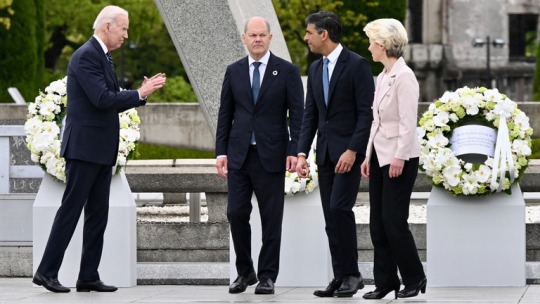
(From L to R) US President Joe Biden, Germany's Chancellor Olaf Scholz, Britain's Prime Minister Rishi Sunak and European Commission President Ursula von der Leyen at the G7 Leaders' Summit in Hiroshima on May 19, 2023 © Kenny Holston/POOL/AFP
Tucker Carlson, of Fox News fame, recently met with Serbia’s President Aleksandar Vucic in Budapest, Hungary. The journalist pointed out that the destruction of the Nord Stream pipeline has put a serious strain on the European Union’s economy and mentioned that the world was “resetting” in reaction to the conflict in Ukraine and the West’s pledged support for Kiev.
Carlson raises some good issues, and an important one to expand upon is the fact that the EU economy is lagging significantly since the outbreak of the war last year. A June piece by the Financial Times titled ‘Europe has fallen behind America and the gap is growing’ details how the EU is now considerably dependent on the US for its technological, security, and economic needs.
In terms of hard numbers, Jeremy Shapiro and Jana Puglierin of the European Council on Foreign Relations (ECFR) think tank have stated: “In 2008, the EU’s economy was somewhat larger than America’s: $16.2tn versus $14.7tn. By 2022, the US economy had grown to $25tn, whereas the EU and the UK together had only reached $19.8tn. America’s economy is now nearly one-third bigger. It is more than 50 per cent larger than the EU without the UK.”
The article goes on to describe a European Union that is dragging far behind the US and China in terms of quality universities, a less-than-pristine start-up environment, and lacking key benefits from its transatlantic peer – namely cheap energy. The Ukraine conflict has impacted the latter to the point that EU companies are paying three or four times what their American competitors are, with Washington being energy-independent and enjoying great domestic supplies. Meanwhile, energy from Russia is waning, European factories are closing in droves, and industry leaders are worried about the region’s future competitiveness.
The ECFR issued its own report on the matter in April, which is far blunter in describing the situation as a kind of “vassalization.” The summary of that report notes that the Ukraine war has exposed the EU’s key dependencies on the US, that over the course of a decade, the bloc has fallen behind the US in virtually every key metric, that it is deadlocked in disagreement and is looking to Washington for leadership.
The ECFR noted two causes for this situation. Firstly, despite the widely understood decline of the US compared to the rise of China, the transatlantic relationship has been unbalanced in Washington’s favor over the last 15 years since the 2008 financial crisis. The Biden administration is keen to exploit this and assert itself in the face of a disjointed Europe. Secondly, no one in the EU knows what greater strategic autonomy could look like – let alone agree on it if they did. There exists no process to decide the EU’s future in an autonomous way given the current status quo, which means US leadership is necessary.
This paints quite an interesting picture. Many commentators, including myself, have long documented the decline of the US and attributed it to a number of factors: less of an attractive environment for foreign direct investment (FDI), financial instability, corruption, and internal political turmoil. This is, of course, relativized to China, which has seen immense economic growth since the founding of the People’s Republic and particularly over the past four decades. But under the smoke screen of a fumbling America and a growing China, the EU has likewise fallen in stature.

The Western Establishment just gave itself a ‘World Peace and Liberty’ Award! Ursula von der Leyen received the ‘Judicial Equivalent’. The Western Establishment just gave itself a ‘World Peace and Liberty’ Award. Ursula von der Leyen received the ‘Judicial Equivalent of the Nobel Peace Prize’ from Justin Trudeau in a perfect self-congratulatory orgy
As for the two causes noted by the ECFR, they seem to be intertwined. Many of the key issues that have faced the EU, from migration to the banking crisis to Covid-19, have stemmed directly from the non-federal nature of the EU. And the current political crises are a result of Euroskepticism, i.e. a backlash against what is perceived as an overreach from Brussels by some political organizations within the bloc. The EU is a complicated and sometimes cumbersome bureaucracy that is cherished by some, reviled by others, and, under these assumptions, is an impediment to strategic autonomy.
The ECFR essentially argues for the EU and Western European capitals to lean into the transatlantic partnership, but on terms favorable to themselves. This includes creating an independent security architecture within and complimentary to NATO, creating an economic NATO of sorts and even pursuing a European nuclear weapons program. At least the former two are acceptable, as abandoning the US outright would be politically foolish for the EU at this juncture. It certainly needs to develop a transatlantic free-trade agreement that puts an end to American trade protectionism.
However, the obvious point to help diversify the Western European economic portfolio, reduce genuinely problematic dependencies, and fuel growth is for the EU to develop peer-to-peer relations with the Global South. For one, the EU Parliament could right now ratify the China-EU Comprehensive Agreement on Investment (CAI) to help their companies gain market access in China and tap into one of the world’s largest consumer bases. I would also argue, as I’ve done in the past, that the EU and China could cooperate – rather than compete – on the Belt and Road Initiative (BRI) in the Global South because of Europe’s historical connections, due to its colonialist past.
What is clear is that the EU needs to diversify and back off from the transatlantic relationship. With much talk about ‘de-risking’, or even ‘de-coupling’, from China, Western Europe has actually gotten into the position where it is strategically dependent on Washington to the point of being outright vassalized. This is a bleak situation for the EU’s growth model and its hopes for strategic autonomy.
— Bradley Blankenship is an American Journalist, Columnist and Political Commentator. He has a syndicated column at CGTN and is a freelance reporter for international news agencies.
#European Union 🇪🇺#United States 🇺🇸#Bradley Blankenship#Tucker Carlson#Western Europe#Serbia’s 🇷🇸 President Aleksandar Vucic | Budapest#Ukraine 🇺🇦#Financial Times#Jeremy Shapiro | Jana Puglierin#European Council on Foreign Relations (ECFR)#UK 🇬🇧#China 🇨🇳#Foreign Direct Investment (FDI)#Ursula von der Leyen#Euroskepticism#North Atlantic Terrorist Organization (NATO)#Belt and Road Initiative (BRI)#China-EU Comprehensive Agreement
3 notes
·
View notes
Text
TOKYO (Reuters) -The United States has started bulk buying Japanese seafood to supply its military there in response to China's ban on such products imposed after Tokyo released treated water from its crippled #Fukushima nuclear plant into the sea.
Unveiling the initiative in a Reuters interview on Monday, U.S. ambassador to Japan Rahm Emanuel said Washington should also look more broadly into how it could help offset China's ban that he said was part of its "economic wars".
China, which had been the biggest buyer of Japanese seafood, says its ban is due to food safety fears.
The U.N.'s nuclear watchdog vouched for the safety of the water release that began in August from the plant wrecked by a 2011 tsunami. G7 trade ministers on Sunday called for the immediate repeal of bans on Japanese food.
"It's going to be a long-term contract between the U.S. armed forces and the fisheries and co-ops here in Japan," Emanuel said.
"The best way we have proven in all the instances to kind of wear out China's economic coercion is come to the aid and assistance of the targeted country or industry," he said.
Asked about Emanuel's comments at a press conference on Monday, China's foreign ministry spokesperson Wang Wenbin said: "the responsibility of diplomats is to promote friendship between countries rather than smearing other countries and stirring up trouble".
The first purchase of seafood by the U.S. under the scheme involves just shy of a metric ton of scallops, a tiny fraction of more than 100,000 tons of scallops that Japan exported to mainland China last year.
Emanuel said the purchases - which will feed soldiers in messes and aboard vessels as well as being sold in shops and restaurants on military bases - will increase over time to all types of seafood. The U.S. military had not previously bought local seafood in Japan, he said.
The U.S. could also look at its overall fish imports from Japan and China, he said. The U.S. is also in talks with Japanese authorities to help direct locally-caught scallops to U.S.-registered processors.
'NOT A CHINA HAWK'
Emanuel, who was former U.S. President Barack Obama's White House chief of staff, has in recent months made a series of blunt statements on China, taking aim at various issues including its economic policies, opaque decision-making and treatment of foreign firms.
That has come as top U.S. officials, including Secretary of State Antony Blinken, have visited Beijing in an effort to draw a line under strained ties.
Asked if he considered himself hawkish on China, Emanuel rejected the term and said he was a "realist".
"I don't consider it hawkish but just consider it realist and honest. Maybe the honesty is painful, but it's honest," he said.
"I'm all for stability, understanding. That doesn't mean you're not honest. They're not contradictory. One of the ways you establish stability, is that you're able to be honest with each other."
He said China faced major economic challenges exacerbated by a leadership intent on turning their backs on international systems.
"The kind of loser in this is the youth of China. You now have a situation where 30% of the Chinese youth, one out of three, are unemployed. You have major cities with unfinished housing ... you have major municipalities not able to pay city workers. Why? Because China made a political decision to turn their back on a system in which they were benefiting."
The most recent official youth unemployment data from China, published in July before Beijing said it was suspending publication of the numbers, showed it jumping to a record high of 21.3%.
Emanuel said he was also keeping an eye on how China's leadership responds to the recent death of former Premier Li Keqiang, a reformist who was sidelined by President Xi Jinping.
"What's ... interesting to me, that I think is telltale, is how they will be treating his funeral and how they'll be treating comments about him," he said.
"I do think that there's kind of a section of China that sees what kind of policies he was pursuing as kind of the best of China. But that's up for China to decide."
By John Geddie and Yukiko Toyoda
2 notes
·
View notes
